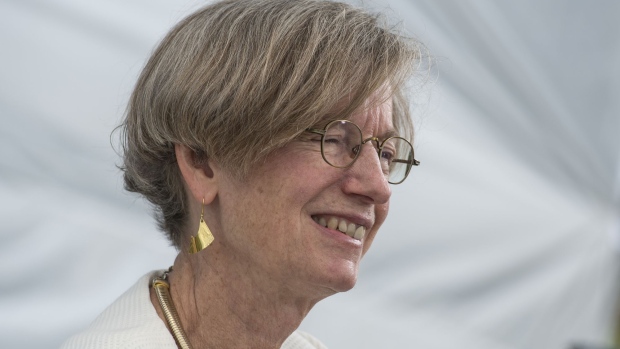Jun 22, 2021
Citibank’s Catherine Mann Named to BOE Rates Panel
, Bloomberg News

(Bloomberg) -- Sign up for the New Economy Daily newsletter, follow us @economics and subscribe to our podcast.
Catherine L. Mann will join the Bank of England’s Monetary Policy Committee in September, the first of two key appointments coming as the central bank weighs when to recalibrate its stimulus for the economy.
Mann, a former chief economist at Citibank and for the Organization for Economic Cooperation and Development, is replacing Gertjan Vlieghe, whose term expires in August, according to a statement from the U.K. Treasury, which names the external members of nine-member rate-setting committee. Jonathan Haskel was also granted a second three-year term on the MPC.
Changes to the nine-member MPC this summer could help shape policy at a critical time. Growth is bouncing back strongly after the worst recession in three centuries, prompting economists and investors to shift their focus toward the risk of inflation.
Naming Mann will also help the BOE reach its diversity goal. Women represented 32% of senior managers at the BOE, according to an annual report published last week, the same as last year when the BOE missed its target.
Mann’s career has taken in both U.S. domestic policy and global analysis at international organizations. She was global chief economist at Citibank from February 2018 to May 2021 and the chief economist and G-20 Finance Deputy at the Organization for Economic Cooperation and Development from October 2014 to November 2017. She has also held positions at Brandeis University, the U.S. Federal Reserve Board of Governors, the White House and the World Bank.
Consumer prices unexpectedly jumped over the BOE’s 2% target in May for the first time in almost two years, spurred by what policy makers expected will be the biggest spending splurge since Margaret Thatcher was prime minister.
While BOE policy makers led by Governor Andrew Bailey maintain that the surge in inflation is likely to be temporary, there’s growing concern it may be more persistent. The bank’s Chief Economist Andy Haldane, due to leave his job at the end of this month, has warned that higher prices may prove more sticky than the bank expects and that policy makers need to think about action.
Vlieghe had been viewed as one of the panel’s most dovish members throughout the pandemic. Last month, however, he said the central bank could raise rates as early as next year in an “upside scenario” that hinges on a forecast-beating economic recovery, potentially lower unemployment and subdued wage pressures.
(Corrects second paragraph to show Mann was chief economist of the OECD.)
©2021 Bloomberg L.P.